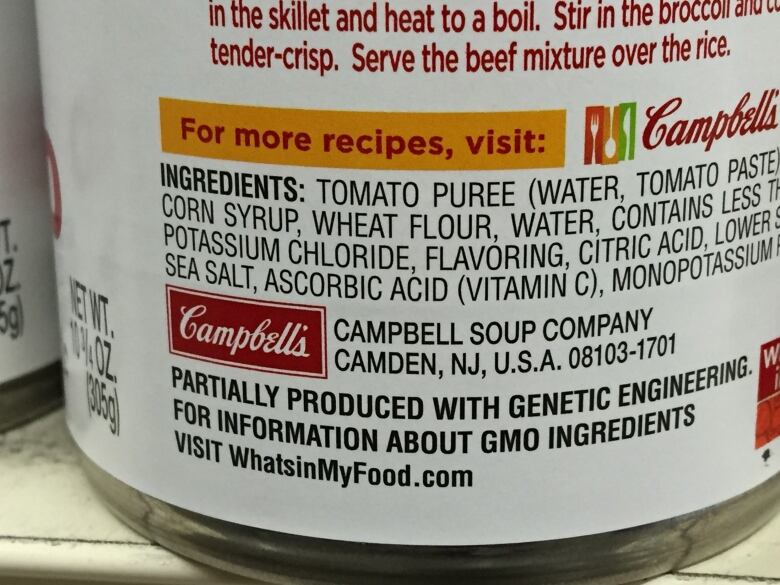Vermont's new GMO law could spur change across U.S.
Genetically engineered foods must be clearly labelled on food packages in state starting July 1

A new GMO labelling law in Vermont is sending ripples through the North American food industry.
Starting July 1, processed foods sold in the state that contain genetically engineered ingredients must say so on the label.
Similar laws exist in countries across Europe, but for now, genetically modified organismsdon't have to be labelled in the rest of the U.S., orin Canada.
DavidZuckerman, an organic farmer and Vermont state senator who pushed for the law, said people in his state want to know where their food comes from.The new law will allow them to decide whether or not they want to buy GMO foods.
"With a labelled product, consumers can make that decision," Zuckerman said.
At agrocery store in Georgia, Vt., staff members have been busy making sure the products they sell comply with a new law, which comes into effect across the state July 1.

From canned soup to bags of chips, new labels reading "prepared with genetic engineering" must now appear on packaged foods made with ingredients that containGMOs.
"I'd like to know the origin of food before we put it in our body,"said Erica Wiggins,as she shopped for groceries with her two children.
"It just seems so simple and it seems necessary."
Some food giants opposed
The law, which passed in 2014 and is only now coming into effect, has faced opposition from somefood companies.
Opponents arguethe new ruleswill hurt Vermont farmers who grow GMO crops and stigmatize products theU.S. Food and Drug Administration says are safe.
The Grocery Manufacturers Association, which represents big-name food brands, sued Vermont to try to block the law, but lost.
Now, companies could face fines of up to $1,000 US a dayfor each item that doesnothave the proper label.
Others have changed their labels to identify genetically engineered ingredients in products across the U.S.
"We can't label our products for only one state without significantly driving up costs for our consumers and we simply will not do that," cereal-maker General Mills said ina statement on itswebsite.
Other food companies, however, have stripped their products of GMO ingredients altogether.Chris Miller, the activism manager at Ben and Jerry's, saidit's a process the ice cream maker started before the law passed.

"Given the fact that consumers were concerned about the useGMOsin food supply chains, given the fact that there was this was this big push to know and disclosure of genetically-engineered ingredients, we just felt that it was the right thing to do," Miller said.
For his part,Jim Harrison, head of theVermont Retail and GrocersAssociation, said he's been fielding questions from worried store-ownersand has even offered webinars outlining what they need to do to comply.
The association is not against labelling GMOs, but says given Vermont's tiny share of the market, its law just isn't practical.
"Some products may not be availableand there may confusion in the market place," he said.
Nationwide rules?
With other states poised to create their own laws, there are calls for a uniformset of labelling rules that would apply across the United States.
U.S. Congress is considering a more lenient bill, backed by the food industry, for voluntary GMO labelling. Under the proposal,producers would have the choice of printing the information on a labelor making it available through a smartphone,or 1-800 number.
Producers and retailers say it would prevent a patchwork of different laws across the country.

But if that passes, Vermont's law would be nullifiedand replaced by a law that David Zuckerman, the state senator, says istoo weak.
"All the proposals that have come out of Washington so far have not been transparent," he said.
"All [are] obtuse ways for people to learn the information, versus very clear labeling that Vermont requires."
For its part,Canada does not require labelling of genetically modified organisms in foods, butthe NDP has been calling for mandatory labelling across the country. Quebec is considering its own legislation,and the province's Agriculture Minister Pierre Paradis has been watching Vermont's efforts closely. Heis in Vermont today to participate inofficialcelebrations marking the law's first day.
CBC News













_(720p).jpg)


 OFFICIAL HD MUSIC VIDEO.jpg)
.jpg)



























































































